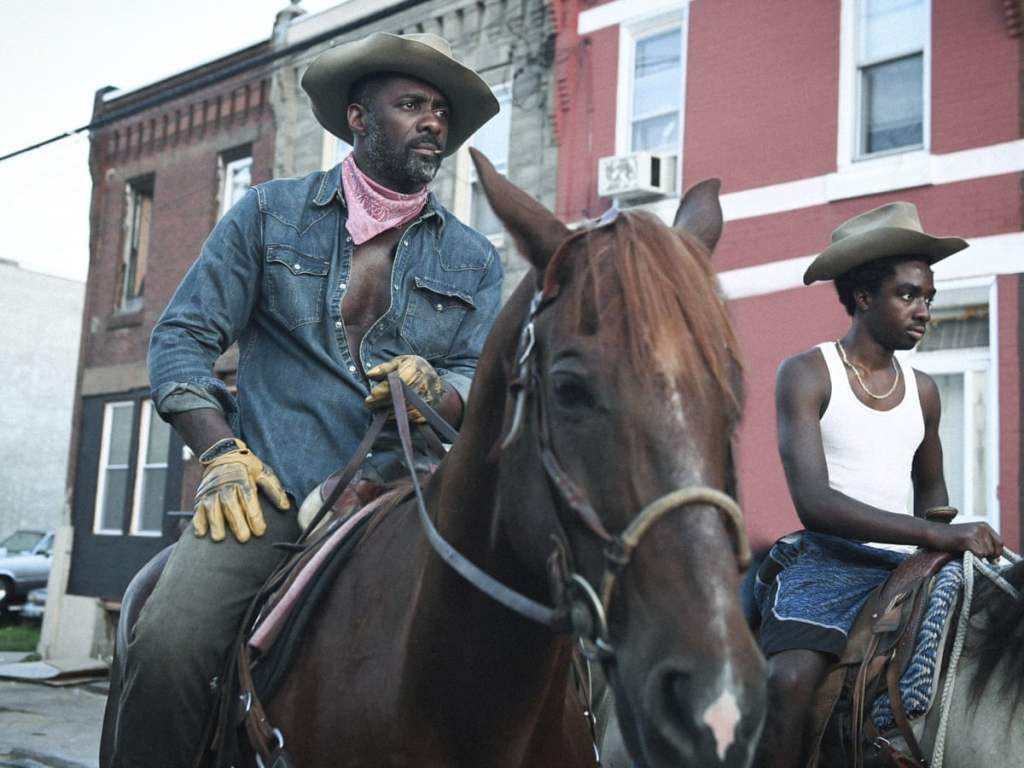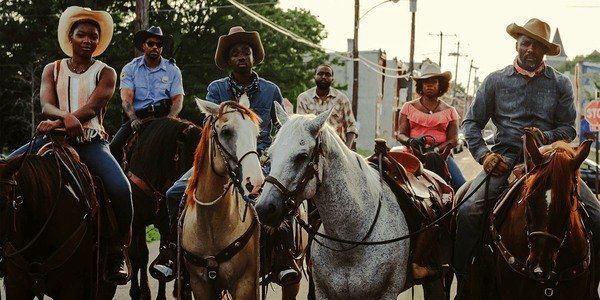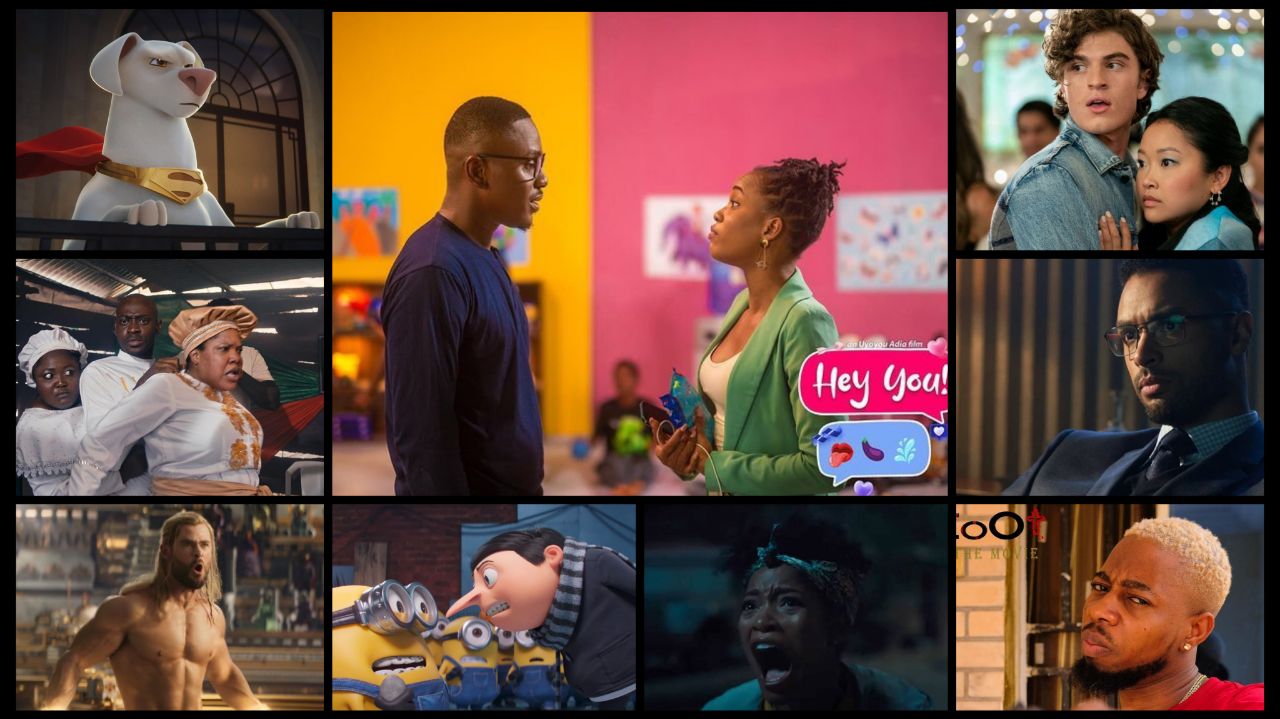Concrete Cowboy continues the fine streak of great film adaptations from novels. This time, the 2021 movie, Concrete Cowboy, is based on the novel, “Ghetto Cowboy” by American author, Gregory Neri. We could continue with background film information to fill the opening paragraph, and perhaps that is the best manner to open a review of this slow-burner film, but it won’t match the heartwarming brilliance of this movie. The charismatic presence of Idris Elba as Harp, an estranged father, merges with the stoicism of Cole, perfectly portrayed by Caleb McLaughlin, in a coming-of-age movie starring cowboys and horses. It would be impossible to successfully write an opener that would successfully capture the communal essence of this movie without betraying its other equally brilliant aspects. Beyond being a communal film, a coming-of-age movie, a father-son movie, and an homage to Philadelphia, Concrete Cowboy is also paradoxically loaded with political and apolitical undertones. And if this opener cannot list it, then surely, its entirety must compensate.

Cole is a troubled kid whose mother has decided to drop off with a father he has never met. The father is a horse lover who, it feels to Cole, loves the small, horse-rearing community more than he loves his family. (A horse lives in their living room.) Slowly, the movie unfolds and Cole begins to question his preconceived notions about his father. And while with his father, Cole breaks and mounts a wild horse and, in the process, achieves a certain control over himself and a new sense of direction.

But the story in Concrete Cowboy transcends Cole. It is also a communal story. It is as much about the small communal space and the black people who live within it as it is about the world beyond that community and its consequences over the community. It is an ordinary story about ordinary people who have regular good days followed by regular bad days. It is about family, the warmth within that perfect societal unit and the consequences of an absence of that unit on the (black) individual. It is a story about what a poor black community can do to its inhabitants. But it is not a Black versus White situation as these scenarios usually pan out. It is about an institutional problem with both parties quite culpable to the detriment of the community.
Concrete Cowboy is also a story about Smush. Smush, played by the gifted Jharrel Jerome, is as much an antagonist in this film as he is an ordinary cog in a grand societal failing. It would have been easy to make Smush a two-dimensional antagonist representing the evil side of American blackness, but there is a nuance to this character’s depiction, nuance without fanfare, as portrayed in the scene where we found out why he is in the drug-dealing business. Smush, to the small community, will always be a bad egg regardless of his motivations, which is why almost everyone in the community warns Cole against being friends with Smush. However, to us, knowing why he is a bad egg gives him fullness and empathy. But Smush, in the end, is an antagonist, and he ends as one.

There are consequences to gangsterism, we know, but Smush isn’t a character to show us the sad end of gangsters, he is much more, according to the film, a portion of the community that sees beyond the community’s views but is limited by the community’s outlook, like a figure trapped in a vicious societal loop—dream, fail, dream different, fail. In a masterful stroke to eulogize Smush’s end , the film slows down. Then the film points to one of its goals: there is a young man, Smush, that the failures of society have claimed, and there is another, Cole, with the potential to be saved, but this potential is endangered if the structure of the small community they thrive in is continuously tampered with.
Cole is one example of the numerous individuals that this horse-rearing Philadelphia community has saved. So, the boy breaks the wild horse, he learns to ride it standing, he gets the girl, and he conquers a substantial portion of his inner demons. Yet, he doesn’t win because there is a larger systemic villain that claimed Smush and could claim him. But the movie points out that this boy, Cole, has saviors: His family unit.

So, there is a father who has disrobed his son and is cleaning blood off the boy with a cloth and water, telling him about horses and his love for them. The boy is dazed because he has just witnessed violence visited upon his friend by gang members. The father is still speaking, listen: in spite of Smush’s waywardness, in spite of how ostracized we made him feel, this boy was one of us, and he belongs to us, and this boy could easily have been you or any other boy from this community; we should have been there for Smush.
There are moments in the film that hold emotional weight, and this is one of them. This, in a small moment, is what the entirety of Concrete Cowboy is. The film slows down in certain points because of the weight of numerous stories it carries, but it functions and delivers with its storytelling. It finds proper arcs for all the characters it investigates. In periods where for example, we find out why Harp gave his son the name he gave him, Coltrane, we heave an emotional sigh. There are punctuations of such sighs all over the movie. And when one completes the movie and one is compelled to write about it, one finds oneself without a befitting opener, without a befitting body, and without a befitting closer. But one hopes that at least, like the movie, one punctuates the review with such sighs of candidness as was encountered in the movie. The shades aren’t perfect, just as the morals of a cowboy, but one tries, because, as you know, there are quality, straightforward protagonist heroes, and then there are cowboys.
Rating: 8/10
Side Musing
- The Coltrane anecdote that Harp explained his love for Cole with is brilliant and effective.
- Prop to the amateur Philadelphia actors that acted in the movie. They were great.
Concrete Cowboys is available on Netflix.



